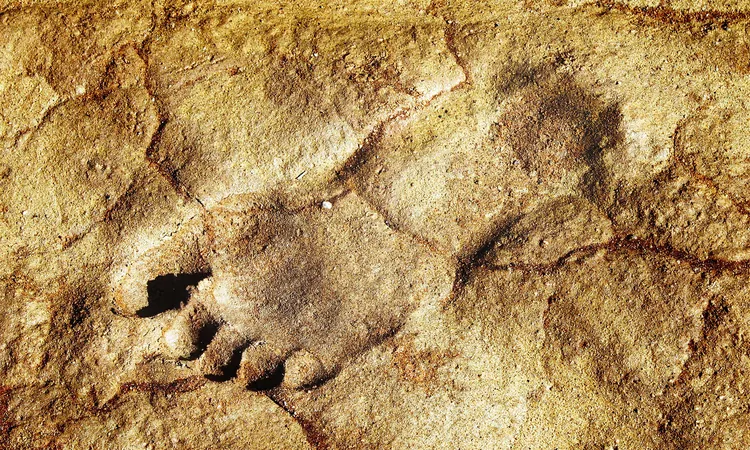
Groundbreaking Discovery: 115,000-Year-Old Human Footprints Unearthed in Saudi Arabia
2025-01-06
Author: Yan
The Discovery of Ancient Footprints
Imagine walking through an ancient landscape where the footsteps of our ancestors echo through time, only to stumble upon a remarkable find—human footprints dating back approximately 115,000 years. This extraordinary encounter became a reality for a group of archaeologists exploring the Arabian Peninsula, as they uncovered the oldest-known human footprints in the region.
Unearthed in 2017 within a unique lakebed area of northern Saudi Arabia, the discovery consisted of seven distinct footprints, nestled among the tracks of prehistoric animals. This find marks a pivotal moment in understanding human migration and life before the Ice Age.
Significance of the Footprints
The research team declared, "We report hominin and non-hominin mammal footprints and fossils from the Alathar lacustrine deposit in the western Nefud Desert, Saudi Arabia." They further argued that these footprints, dating back to the last interglacial period, align with an early dispersal of Homo sapiens from Africa, suggesting that this is the earliest evidence of our species in the Arabian Peninsula.
The story of human evolution is deeply intertwined with the migration patterns that shaped civilizations. Most scientists believe that modern humans originated in Africa about 200,000 years ago before venturing outwards. The Arabian Peninsula served as a critical "gateway" for these early humans, facilitating their movement into Asia and beyond. The region's diverse landscapes provided ample resources, helping these early groups not only survive but thrive.
Insights from the Alathar Lakebed
As this new evidence unfolds, theories regarding the timeline of Homo sapiens' arrival in Arabia continue to evolve. The Alathar lakebed—translated to "the trace" in Arabic—offers significant insights into a bustling environment over a century millennia ago. The remarkably preserved footprints were likely made in a brief time span, hinting at a vibrant ecosystem.
In a fascinating comparison, researchers noted that modern experimental studies suggest fine details of footprints in mud can be lost within days, emphasizing the uniqueness of the Alathar discovery. Mud, reminiscent of nature's archival capabilities, captures history amid the rapid erosion of impressions on its soft surface.
Understanding Early Human Behavior
The findings point to the footprints being attributed to Homo sapiens, with the size and structure being inconsistent with those of Neanderthals. Notably, the team found no evidence of tools or hunting practices associated with these early humans in the area, leading to speculation that these transient visitors may have stopped by primarily for water.
This intriguing discovery raises critical questions—not just regarding who left the footprints, but also why they remained undisturbed by subsequent groups. One theory posits that these footprints may represent the last vestiges of a temperate group navigating through a landscape before it transformed into the arid expanse we recognize today due to the onset of the Ice Age.
A Glimpse into an Ancient Ecosystem
Notably, the Alathar Lake footprints offer more than just evidence of human presence; they paint a vivid picture of a lush ecosystem that existed 115,000 years ago. Accompanying footprints of elephants, camels, and antelopes provide insight into a dynamic environment where humans and animals shared vital resources. It suggests a brief yet significant interaction between species, giving researchers a clearer understanding of both human history and the broader ecological landscape prior to dramatic climatic changes.
This remarkable research, published in the journal Science Advances, not only challenges our perceptions of ancient human life but also highlights the intricate connections between ecosystems and early human behavior.
Conclusion
Stay tuned for more updates on this captivating discovery and how it reshapes our understanding of human history!

 Brasil (PT)
Brasil (PT)
 Canada (EN)
Canada (EN)
 Chile (ES)
Chile (ES)
 Česko (CS)
Česko (CS)
 대한민국 (KO)
대한민국 (KO)
 España (ES)
España (ES)
 France (FR)
France (FR)
 Hong Kong (EN)
Hong Kong (EN)
 Italia (IT)
Italia (IT)
 日本 (JA)
日本 (JA)
 Magyarország (HU)
Magyarország (HU)
 Norge (NO)
Norge (NO)
 Polska (PL)
Polska (PL)
 Schweiz (DE)
Schweiz (DE)
 Singapore (EN)
Singapore (EN)
 Sverige (SV)
Sverige (SV)
 Suomi (FI)
Suomi (FI)
 Türkiye (TR)
Türkiye (TR)
 الإمارات العربية المتحدة (AR)
الإمارات العربية المتحدة (AR)